Yesterday, in what still feels like a targeted effort by scientists in a government laboratory to make me, personally, weep myself into blindness, Warner Brothers released the second trailer for The Goldfinch. If you’re not familiar, I’ll catch you up in just a second — but have a look, first:
Yes, as if it wasn’t enough to cast Finn Wolfhard — whom I own, in plush form — as a key character in a Donna Tartt adaptation, they had to go and sling “Terrible Love” by The National behind all these scenes of tender adolescent yearning and dead-mom trauma. If they were trying to hook me, it worked. I will be there opening weekend with bells on and travel-paks of Kleenex stuffed into every pocket of my jacket.
But I digress. Let’s talk about that brief moment — at the 1:59 mark in the trailer above, and giffed below — where the protagonist, teenage Theo Decker, says goodbye to his best friend, juvenile delinquent and insouciant Ukrainian émigré Boris Pavlikovsky.
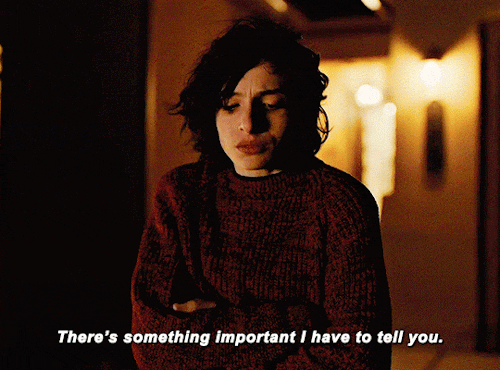
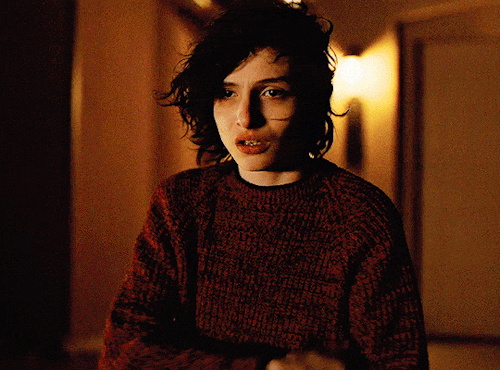
Gifs by winterswake.
In the novel, this is how Donna Tartt describes the moment:
I was still babbling when Boris said: “Potter.” Before I could answer him he put both hands on my face and kissed me on the mouth.
…We stood looking at each other — me breathing hard, completely stunned.
“Good luck,” said Boris. “I won’t forget you.”
…More than anything I was relieved that in my unfamiliar babbling-and-wanting-to-talk state I’d stopped myself from blurting the thing on the edge of my tongue, the thing I’d never said, even though it was something we both knew well enough without me saying it out loud to him in the street — which was, of course, “I love you.”
Now, in case you’re unfamiliar with North American cultural conventions, the act of one boy kissing another boy on the mouth is generally described as “gay,” or even “homosexual,” to use somewhat outdated parlance. The act of racing away in a taxi while a boy you’ve just kissed lingers on the road behind you and you contemplate how greatly you love him is, likewise, “gay.” It can be inferred from this and other passages in The Goldfinch — for instance, the passage where Theo recounts the multiple times he’s had sexual intercourse with Boris — that neither Theo nor Boris is “straight.”
Oh, sorry, did I not mention that Theo and Boris have sexual intercourse multiple times? And that Donna Tartt is not subtle about it?
And yet (this was the murky part, this was what bothered me) there had also been other, way more confusing and fucked-up nights, grappling around half-dressed, weak light sliding in from the bathroom and everything haloed and unstable without my glasses: hands on each other, rough and fast, kicked-over beers foaming on the carpet — fun and not that big of a deal when it was actually happening, more than worth it for the sharp gasp when my eyes rolled back and I forgot about everything; but when we woke the next morning stomach-down and groaning on opposite sides of the bed it receded into an incoherence of backlit flickers, choppy and poorly lit like some experimental film, the unfamiliar twist of Boris’s features fading from memory already and none of it with any more bearing on our actual lives than a dream. We never spoke of it; it wasn’t quite real; getting ready for school we threw shoes, splashed water at each other, chewed aspirin for our hangovers, laughed and joked around all the way to the bus stop. I knew people would think the wrong thing if they knew, I didn’t want anyone to find out and I knew Boris didn’t either, but all the same he seemed so completely untroubled by it that I was fairly sure it was just a laugh, nothing to take too seriously or get worked up about. And yet more than once, I had wondered if I should step up my nerve and say something; draw some kind of line, make things clear, just to make absolutely sure he didn’t have the wrong idea. But the moment had never come.
Later on, when Boris and Theo reunite as adults, we get this scene:
“It’s just — we did crazy things back then. Things I think you don’t remember. No, no!” he said, quickly, shaking his head, when he saw the look on my face. “Not that. Although I will say, you are the only boy I have ever been in bed with!”
My laugh spluttered out angrily, as if I’d coughed or choked on something.
“With that –” Boris leaned back disdainfully in his chair, pinched his nostrils shut — “pfah. I think it happens at that age sometimes. We were young, and needed girls. I think maybe you thought it was something else. But, no, wait,” he said quickly, his expression changing — I’d scraped back my chair to go — “wait,” he said again, catching my sleeve, “don’t, please, listen to what I’m trying to tell you…”
Again, if you’re unfamiliar with North American cultural conventions, you’re likely aware that being “gay” is frowned upon — well, not so much “frowned upon” as “subject to systemic oppression, violent harassment, the curtailing of basic civil rights and freedoms, estrangement from one’s family, economic subjugation, legal penalties and, oh yeah, death.” In spite of these nigh-insurmountable obstacles, many folks nonetheless participate in “gay” activities. Some people are open about it; others, fearing opprobrium, prefer to keep the whole thing a secret. This is a phenomenon that we call “the closet.” When a person declares freely and openly that they are gay, they are said to have “come out of the closet.” If they are not yet at this point, they are said to be “closeted.”
It’s clear to me that the characters of Theo and Boris, two young boys who love each other deeply and engage in sexual intimacy that they don’t tell anyone else about, are closeted. They could also be fairly described as “questioning” — that is, using their relationship to explore fundamental elements of their own sexual identities. Either way, though, these are absolutely not “straight” characters in any sense of the word.
And yet… wow, there sure are a lot of people insisting that there’s nothing gay about two boys having sex!

Strictly speaking, we don’t know if Boris is gay. He has romantic and sexual relationships with a few girls, and he marries a woman in his adulthood, but there’s a distinct lack of passion in his marriage, and it’s made clear that his relationship with Theo is the most important one in his life by a long stretch. Also, not for nothing, but bisexuality: it exists!
What’s even more concerning is this idea that “it was just a one time thing” — I mean, it wasn’t; the book makes it clear that they have multiple sexual encounters — or that their whole sexual relationship can be reduced to “drunk sex” when, in fact, we’re talking about repeated encounters that Theo and Boris willingly and enthusiastically participate in and remember the next morning. They’re motivated by exterior homophobia to dismiss this sex as “just a laugh,” not something intrinsic to their identities. Readers aren’t meant to look at these passages and go, “Oh, right on, yeah, there’s totally nothing serious about what’s going on here, just lads being lads, just a bit of cheeky drunk, gay sex.”
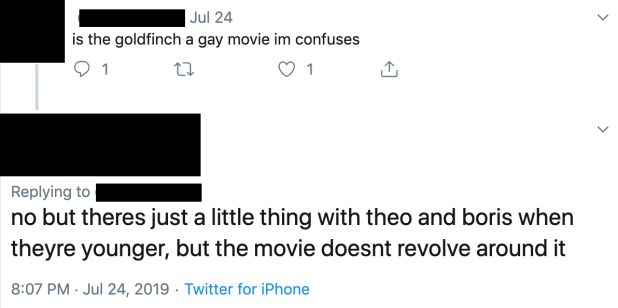
Without spoiling too much, yeah, the story actually does revolve around Theo and Boris’s relationship. Boris returning to Theo’s life in his adulthood literally drives the entire plot to its conclusion. No, the book isn’t a straight-up romantic-drama like, I don’t fucking know, The Notebook, where the story revolves entirely around a romance, but there is a romance, and it is a gay romance, and it’s not “just a little thing.”
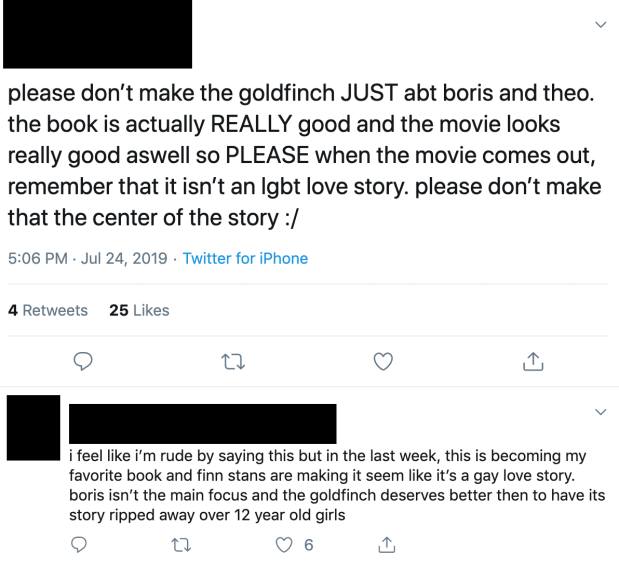
Ah, yes, insisting that “12 year old girls” are going to ruin a “REALLY good” book by pointing out the explicit, overt, on-the-page gay love story contained within the book. Not homophobic in the slightest.

But okay, okay, enough chatter from random Twitter dingbats. Let’s focus in on this critique: that the scene in the trailer, where Boris kisses Theo on the mouth, is queerbaiting.
What is queerbaiting, anyway? According to Wikipedia:
Queerbaiting is a marketing technique for fiction and entertainment[1] in which creators hint at, but then don’t actually depict, same-sex romance.[2] They do so to attract (“bait“) a queer audience with the suggestion of relationships that appeal to them,[3] while at the same time attempting to avoid alienating other consumers.[1][4]
The term rose to popularity in the late 2000s and early 2010s, where a flurry of popular TV shows — most notably, Sherlock, Supernatural, and Merlin, among many other culprits — revolved around extremely close platonic relationships between two men. These shows garnered enormous fan followings who were invested in the possibility of these men getting together romantically, and the writers of these shows “baited” those fans by including, say, scenes where the two men are mistaken for a couple, or declare that they love each other, or say, “If I were gay…” or “If [Dude #2] were a woman…” Crucially, though, these two men never kissed, much less fucked. They often had straight female love interests. (Less frequently, the two central figures were women, and there was a little more wiggle room to depict physical intimacy here; consider the infamous “Gilmore Girls” scene where Paris Geller kisses Rory Gilmore on the mouth, ostensibly to “impress boys.” Of course these characters aren’t lesbians; it was all just a laugh!)
Put bluntly, a boy kissing another boy on the mouth cannot, definitionally, be called queerbaiting. A boy having sex with another boy cannot be called queerbaiting. Nor can these acts be called “gay coding,” which refers to the notion of ascribing gay characteristics to a character who is not textually gay and does not engage in textually gay acts, like every frou-frou, hot-pink Disney villain ever.
A comment I’ve seen more than once, from more than one person, is that The Goldfinch is “not a gay love story, like Love, Simon.” I interpret this to mean that The Goldfinch does not, like Love, Simon, include a scene where Theo and Boris come out. They kiss each other, and they love each other — and they even go one step further than Simon and do it in the butt — but they don’t actually say, “I am gay.”
Now, I personally don’t see why the lack of an overt “I am gay” makes Donna Tartt’s complex, finely shaded portrayal of adolescent gay love and gay sexuality any less, well, gay. But clearly, some people do! So let’s take a closer look at the comparison to Love, Simon.
Now, I love Love, Simon with my whole entire heart. (Full disclosure: Becky Albertalli and I share a literary agent, but I loved Simon Vs. the Homo Sapiens Agenda before I signed with him; in fact, I signed with him, in part, because I love the book.) But Love, Simon is not the standard against which every other gay love story should be evaluated. That is: gay love stories are not worthless if they don’t include an explicit declaration of being gay. Although Love, Simon centres around Simon’s decision to come out, he is not made gay by his coming-out. Simon is still gay at the beginning of the story, in the closet, when his dad teases him about liking Gigi Hadid and he tortures himself by going to junior-high dances with girls. When Simon was in the early stages of dating Blue, exchanging sweet, flirty e-mails and fantasizing about what it might feel like to kiss, or have sex, he was a gay person engaging in a gay relationship. The fact that he kept the relationship a secret and insisted to others that he was straight did not negate the fact that we were watching a gay love story unfold. And if Love, Simon had concluded with Simon still in the closet, choosing to continue to date Blue in privacy, it would still be a gay love story!
It’s fascinating to see how the goalposts have shifted in recent years. Like, if Sherlock had laid a kiss on John in the glory days of Sherlock, or, uh, Supernatural Guy #1 had fucked Supernatural Guy #2 onscreen, fans would have rejoiced. Now, apparently, that wouldn’t be enough. Now, apparently, any gay intimacy that takes place without the characters saying, “I am gay” beforehand counts as queerbaiting.
And that’s… not great, namely because closeted people do exist, and questioning people do exist, and widespread homophobia that necessitates people carry out their relationships in secret does exist. Hopefully, we’re all under agreement that nobody is contractually obligated to come out of the closet; hopefully, we know that it’s simply not safe or feasible for every LGBT person to live their life as openly as they might like to. In the case of Boris and Theo, we’re talking about two teenage boys who have already learned from the culture around them that there is something categorically wrong about their love for each other. They’ve both chosen to keep it a secret — likely for safety reasons, since both boys have abusive fathers who are depicted brutally beating them. To declare that their love story isn’t actually gay unless they come out isn’t just nonsensical; it’s cruel.
I used to volunteer with an LGBT youth hotline, and I can’t count the number of calls we got from kids who knew, on some level, that they were queer, but were absolutely terrified of coming out. Often, they had openly homophobic parents. Often, kids at school had been mean. Often, they were worried that they were cowards because they couldn’t bring themselves to come out. And each time, we had to assure these kids: You’re not a coward. You’re not doing anything wrong. You’re allowed to come out on your own time, and on your own terms.
In the pop cultural arms race to have the First Openly Gay This and the First Openly Trans That, what’s been lost, I think, is that the average person’s path to coming out always involves secrecy and silence. There are long periods of active, outright denial of self: of course I’m not gay; of course that kiss didn’t mean anything. If we want to represent gay experiences in their totality, we need to put these narratives onscreen. Honest depictions of the closet are not bait; they’re life-vests thrown overboard to struggling young people. Have a heart. Use your brain. Watch The Goldfinch in theatres on September 13, 2019.
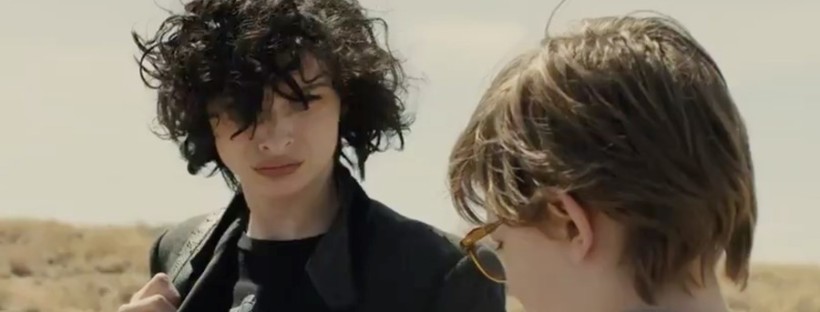
I think the opening of the discussion of “queerbaiting” in current media is really interesting and has been coming to a point lately. There are several shows and movies that people have tried and throw under the figurative bus the past year or so. While the hypercritical take seems to be more harmful to queer stories that don’t take on the typical expectations of- you come out, you fall in love, and then you live happily ever after. Its a good reminder that queer/lgbt+ stories are diverse and as such should be told in a diverse fashion through media. As well as that something can have a subtle romance and a subtle queer storyline without that being the main plot because most importantly lgbtqa individuals should just be allowed to exist.
LikeLiked by 3 people
I completely understand your point of view, and that the pressure of having every lgbt person be out in media has an effect on young lgbt people. i would like to point out that i really like the goldfinch, and i don’t hold the author to any of my opinions. however, i am of the opinion that right now, in 2019, the goldfinch is not an adaptation that should be made. the subject of queerbaiting is a hazy one, and i agree with you on the fact that the goldfinch doesn’t do it. the goldfinch does something else entirely. it’s a different realm. boris and theo are not in a closeted relationship. and so the question is not “is it queerbaiting” but “is it representation.” do boris and theo deserve the credit of “queer love story” if someone can still deny the fact that they were in a relationship, if the text itself can deny they were in a relationship? objectively it’s hazy. and right now, media does not need “hazy, sort of, maybe they were gay?” representation. if you can deny they were in a relationship then i don’t think it deserves to be called representation at the moment. if you presented this exact movie to me, 5 or 10 years from now, after a lot more lgbt people in movies, a lot more concrete “these two people are in love” in-text relationships, i would be delighted. if you presented the goldfinch to me with a throwaway line about how yes, boris and theo were/are in a closeted relationship in their teens, then i would be delighted. it’s a deliberately queer narrative, but it’s lacking in the fact that anybody can see boris and theo and go “those two are just friends” they’d be wrong, but they would have in-text support to back the claim up. the simple fact is we do not have enough concrete “these two boys love each other romantically and you can’t deny it” for someone to go around and say “we need a hazy maybe they romantically love each other” movie. we have already had a lot of those. i see your point, but you’re worried about queer closeted youth not seeing themselves in media when we don’t have queer youth in general seeing themselves in media
LikeLike
i understand the intentions of where you’re coming from, but the goldfinch isn’t a story that exists for the purpose of people projecting onto it. it tells a story, regardless of whether or not that story is relatable. media should not have to abide by someone’s arbitrary standard of what is and isn’t “good representation” in order to be worthy of telling.
(and i would still argue that boris and theo’s romantic/sexual significance to each other is still obvious in-text, whether or not people are willing to dig into the text to find that. can’t speak for the movie yet, but an on-screen kiss buffeted by subtext would seem to hold enough water)
LikeLiked by 2 people
Yeah, I agree with G – the idea that all gay characters must be positive representations of the gay community is something I just don’t agree with at all. Real LGBT peoples’ lives are complex and nuanced, and we need more of that in popular media, not less.
LikeLiked by 2 people
This is an excellent essay (I just discovered this blog). I have to disagree with G when they say “The Goldfinch isn’t a story that exists for the purpose of people projecting on to it”. Maybe I’m missing their point, but every story exists for the purpose of people projecting on to it, no matter what the author intends.
LikeLike
Loved this essay! And agree with it. Theo and Boris are certainly in love with each other, and their love is more poignant than the one we see between Theo and Pippa – because they both accept each other with their flaws and love each other while being sincere with one another about themselves. I see both of them more as bissexual than gay. They have a relationship so deep than it pours as a romantic relantionship, but they can also engage in heterossexual relationships and find pleasure in it. I wished only we could see a glimpse of their coming-out later in the book… Or more love material after they reencounter.
LikeLike
I can’t comment on the book because I haven’t read it. However, I have just watched the film and came away with the impression that Theo is likely straight and Boris is likely gay. The film only shows Theo’s attraction to women (Pippa and Kitsey) and it only shows Boris’s attraction to Theo. In fact, the structure of the film even gave me the impression that Theo is to Boris what Pippa is to Theo (an unattainable soulmate).
Also, regarding Maggie’s comment above, I think that she is trying to say that there is a phenomenon that is similar to queer baiting, whereby the ‘gay’ act has so little depth that it can be dismissed as not gay at all. For example, there is so little context around the kiss in the film that it can easily be dismissed as ‘not gay’ — or at least it’s possible to dismiss it.
Or in other words, some characters are written so ambiguously that it is up for the reader/viewer to infer their sexuality or project a sexuality onto the character — which feels like hollow representation. Characters don’t need to be explicit about their sexuality, but there needs to be enough context to understand whether they are gay, bisexual, questioning, etc.
Great essay, by the way.
LikeLike